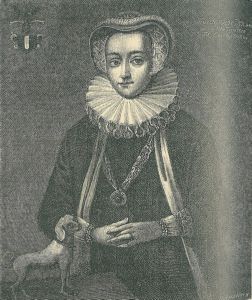Business & Education
Discarding classics and courtship, Tycho Brahe’s kid sister was his equal in most other matters
This article is more than 9 years old.
We might be in the dark about Renaissance astronomer Tycho Brahe’s wife, but we know plenty about the other woman in his life, his soulmate sibling Sophie

Born into one of the richest families of the time, and destined to live her life under the shadow of her famous older brother, Sofie Brahe was nevertheless a gifted scientist in her own right (photo: Illustreret Dansk Litteraturhistorie)
Sophie Brahe was not just the little sister of pioneering astronomer Tycho Brahe, she was a gifted scientist in her own right. She might not have been very good at Latin, and she was certainly bad at choosing her men, but these were about the only subjects she had difficulty with.
Sophie Brahe was perhaps the only woman of the Renaissance to be proficient in astronomy, astrology, mathematics, chemistry, medicine, genealogy, botany, literature and German. This was even more impressive considering she was entirely home-schooled, as university was still a closed area for women.
Soul mates in science
For some reason there is some uncertainty about Sophie’s date of birth, which was either 22 September 1556 or 24 August 1559 – both dates fit the astrological chart big brother Tycho drew up for her. This makes her at least ten years his junior in a family of ten children; she was not Tycho’s only sister, but she was far and away his favourite. Sophie and Tycho became soulmates in their pursuit of science, two kindred minds in a family who never really understood them.
Born into one of the richest families in Denmark at the time, the eligible Sophie married young, in 1579, to a nobleman much older than herself, Otto Thott. Thott owned Eriksholm Manor in Scania, now part of Sweden but in those days still under Danish rule. They had one son, Tage – who was to be Sophie’s only child. A year later, in 1588, Thott died, leaving Sophie as a widow before her 30th birthday.
Though Sophie continued to manage Eriksholm on behalf of her son until he came of age, much of her time was spent on Tycho’s island of Hven, between Denmark and Sweden, where he kept his observatory, Uranienborg. Here she was looked upon and respected as a fellow scientist, and in the strange hybrid of science and classical mythology that coloured Renaissance academia, she called herself ‘Urania’ – the muse of astronomy – to big brother Tycho’s ‘Apollo’.
Sophie’s bad choice
With the help of her brother, Sophie got a chance she would probably never have had otherwise: to be taken seriously as a scientist. In return, it is believed that Sophie helped him out socially, performing many of the social duties that his wife, who as a commoner was not recognised among gentlemanly circles, was unable to fulfil.
It was on one of her frequent visits to Hven that Sophie met Erik Lange, a gentleman of good stock who had lost much of that high standing due to his obsession with alchemy. To this end he had invested so much money that two years after Sophie and he began their courtship, in 1592, he had to flee his debtors and his country.
Although Sophie had met Lange at her brother’s abode, Tycho was completely against the match, but his sister was in love, and no-one’s good advice was going to stand in her way. Seven years after he left, Sophie, alone and unstoppable, went to Germany to find Lange. After much searching she found him and they were married in 1602 in Eckernforde, Germany. The pair lived in such a state of poverty that she could not afford a pair of stockings for their wedding, she revealed to her sister Margrethe in a letter, and the groom’s clothes had to be pawned shortly afterwards.
A star in the garden
Lange continued in his futile attempts to make gold, trapping the couple in poverty for their entire marriage. It was perhaps a relief to Sophie when he died in 1613, leaving her a widow a second time, and not a penniless one. She duly returned to Denmark where her son still ran the estate at Eriksholm.
The garden at Eriksholm was famous not only for its flowers – many of which were new varieties to Scandinavia introduced by Sophie herself – but also for the medicinal herbs she cultivated, prescribing them to family members as well as to the local villagers.
At a time when most wealthy women contented themselves with mapping out family trees or learning to paint portraits, Sophie Brahe transcended gender with a knowledge of science on a par with big brother Tycho’s. She was hampered by two things: her ignorance of Latin, which Tycho saw as her main obstacle in being taken seriously by scholars, and her choice of husband, which left her poor and depressed while her brother was rich and famous.
Outliving both her brother and two husbands, Sophie Brahe died in Helsingør in 1643.










































